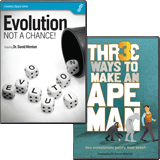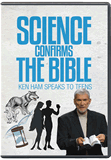More Questions
Last Word
“Early man”—the field is loaded with unanswered questions. To make matters worse, the more we learn, the more questions we seem to have. Why would the magazine broach so unsettled a topic?
Ever since I converted to Christ in college, I’ve been hoping to reexamine what I learned in my youth about “early man.” Childhood stories still swirl around in my head, and I would like to put some of them to rest.
I vividly recall the day in second grade, for example, when our teachers pulled back the partition so that our combined class could hear a special story: how the first cavemen discovered fire. (It was a lucky accident, we were told—lightning struck a tree and set it ablaze.) That simple lesson set my young mind on a profound journey to sort out who I am.
Like many other homes in the 1960s, ours had the entire 26-volume Time-Life science series sitting on the bookshelf. I regularly perused Early Man, fascinated by the illustrations of snarling, hairy brutes who took down and dismembered mighty elephants. That’s where I first learned about my ancestors.
What have we learned since then? I was looking forward to the day that the magazine could reexamine Homo erectus and his kin, but I was leery, too, because the whole field seems rife with unanswered questions.
What would edify readers? Can a magazine called Answers—whose stated goal is “building a biblical worldview”—publish on topics for which our answers are incomplete?
A partial answer came during a Sunday school class on Job. After hearing all those questions from Job and his friends, how did God respond? More questions! Amazingly, God asked dozens and dozens of questions that were not directly related to the questions of Job and his friends.
God continues this pattern in the New Testament, where Jesus often “answered” questions with more questions (e.g., Luke 20:3). What an interesting way to answer questions!
He wants people to humble themselves before their Creator even without the answers.
What is God’s purpose? He seems to want something deeper than satisfying our every question. He wants people to humble themselves before their Creator even without the answers (Job 1:20; 42:1–6).
An old saying says, “The more we learn, the more questions we have.” That was certainly true in my life before my conversion to Christ, and it is even more so now, as my “biblical worldview” grows. The more I discover, the more questions I have. It’s humbling.
As I talk to people about my Savior, my job is ultimately to point them, not to pat answers, but to the One who has all the answers. Following the example of Job, Proverbs, and other scriptures, I should discourage people from being puffed up with knowledge and instead encourage them to submit to God’s absolute authority and walk by faith in Him (Proverbs 3:5–6; 2 Corinthians 5:7; etc.).
This faith is not based on ignorance. The more things that God allows me to learn, the more reasons I can give to trust Him. (What was the first known fire? I read about a flaming sword in the Garden of Eden and burnt sacrifices, but no lucky thunderbolts.)
Studying human remains and artifacts is only one of a million stepping-stones in this process of recognizing God’s greatness and the gaps in my own understanding. Which of Noah’s descendants were Homo erectus? Why were they out hunting elephants rather than founding cities? The questions will never cease. But if a person’s goal is to grow in knowledge of the Creator of the universe (2 Peter 3:18), he should continually expect to discover new things that he can’t fully understand.
Having answers doesn’t mean I can answer every question. It means I can point people to the One who has all the answers: Jesus Christ (Colossians 2:3).
Answers Magazine
April – June 2012
Now’s your chance to answer every question you ever had about cavemen! This issue is chock full of the latest information about Neanderthals, Homo erectus, “the Hobbit,” and other media stars. Were they like us? How did they die? Also learn about the wonders of the sun, creatures that glow in the dark, and the reason all Hebrew scholars agree that Genesis 1 says creation was six literal 24-hour days!
Browse Issue SubscribeRecommended Resources

Answers in Genesis is an apologetics ministry, dedicated to helping Christians defend their faith and proclaim the good news of Jesus Christ.
- Customer Service 800.778.3390
- © 2024 Answers in Genesis







